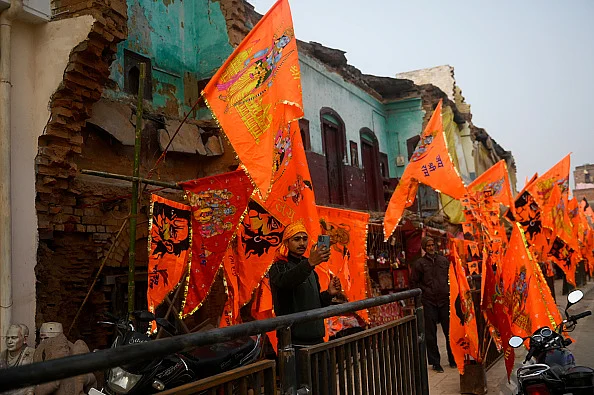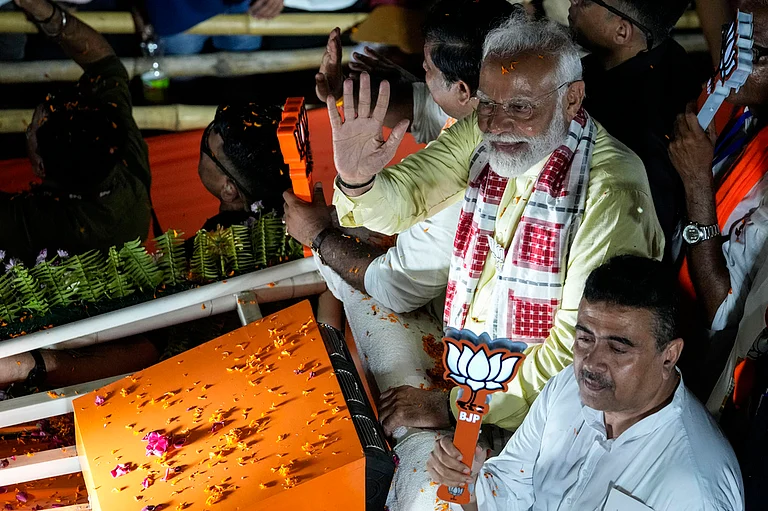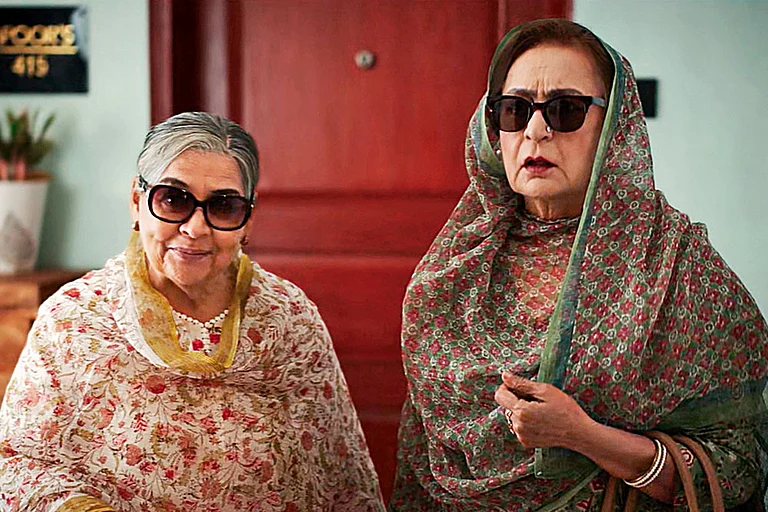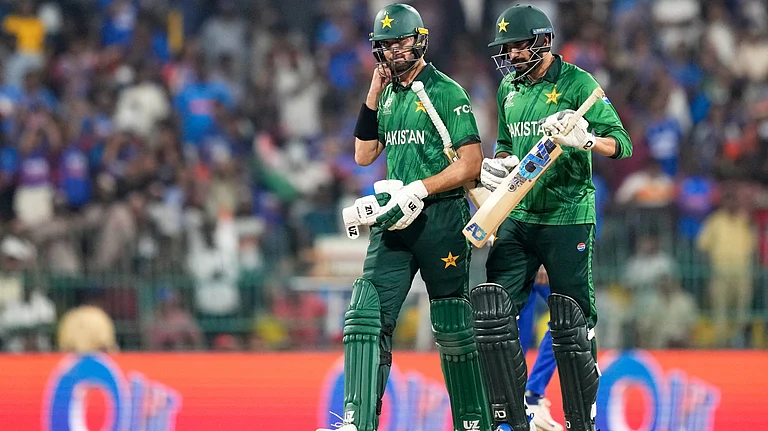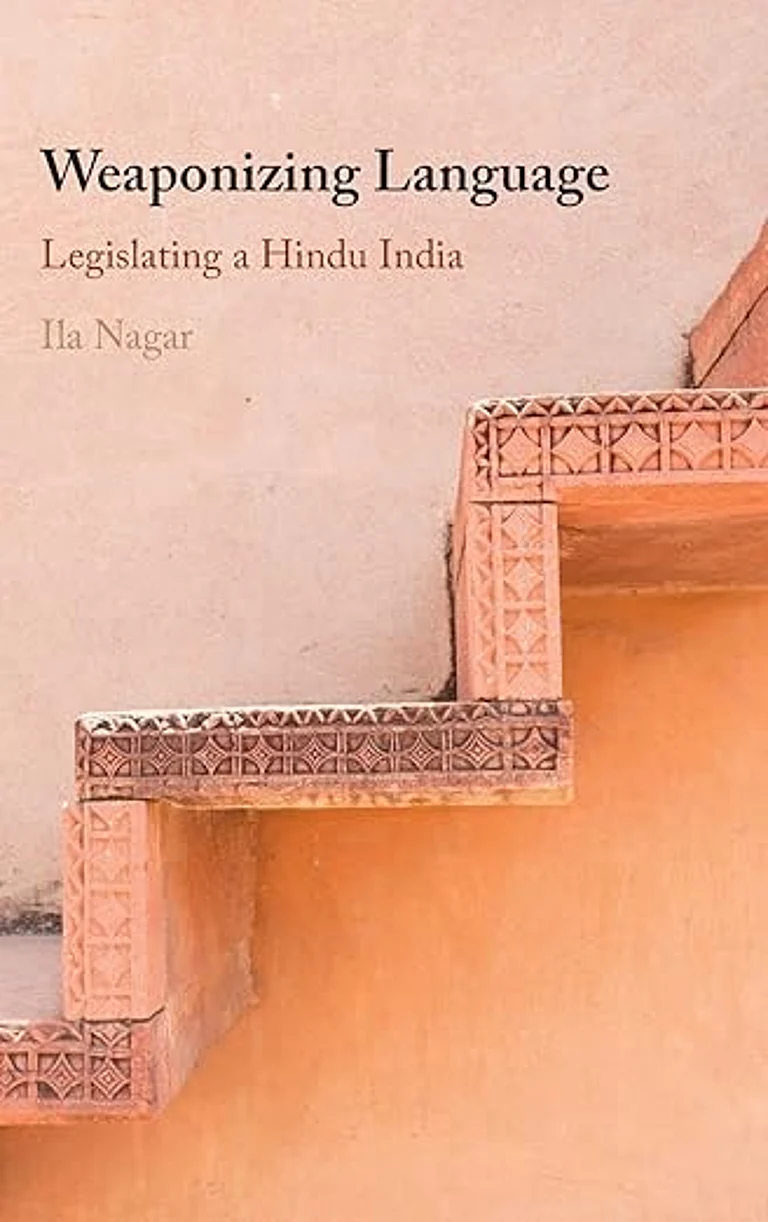‘As I sat among the women of Tehri Bazaar and watched them laugh, talk and go about their business, a man in a black cloak walked in. He looked and sounded authoritative. Noticing me, he said, ‘I forgot to introduce myself. I am Advocate Mohammed Ansari.’ A typical Indian quirk of prefixing the profession to the name! He claimed he was a fan of Emperor Aurangzeb, the sixth Mughal ruler. He justified his love for the emperor. ‘He lived like a true Muslim. He despised the spendthrift and self-indulgent rulers, which is why he even imprisoned his father, Shah Jahan. He wanted to propagate the spread of Islam and, in the process, he constructed several mosques.’
Advocate Ansari dodged questions about the mosques that were built after pulling down temples during the reign of Aurangzeb. He promptly changed the topic when I brought this up and instead complained that he could not settle in Pakistan after the 1947 Partition because the family was not wealthy enough. ‘My family did not have the money to shift. Besides, at that time, we felt we would be treated well here. Today, I blame the Sanghis for having embittered us. The rift between the Hindus and Muslims in Ayodhya has been created mainly by them.’
His scorn included both Hindus and the moneyed Muslims. In Ayodhya, the latter has even grabbed vast areas of the available Waqf properties. Finally, he ended with a prophecy. ‘But wait and watch, in a century or two, there will be a Muslim rule yet again, and this cruelty will be avenged.’
Like Advocate Ansari, there are numerous Muslims whose hearts and minds still remain divided between India and Pakistan. Nothing epitomizes this internal division more than the gentleman’s game of cricket. It is not a rare sight in an Indian city, town or village, to see Muslims celebrate Pakistan’s victory over India.
When Pakistan wins, the loud cheers from the Muslims reverberate through colonies where they are in sizeable numbers. As a couple of examples, we have Mohammad Ali Street in south Mumbai and Park Circus in central Kolkata.
Such sentiments of Muslims being the ‘other’ in their own country, meaning Pakistani, are even fanned by Hindu politicians, leaders and senior officials, who time and again ask the Indian Muslims to ‘pack their bags and go to Pakistan’. On 20 December 2019, Akhilesh Narayan Singh, a senior police officer from Meerut, a town in western Uttar Pradesh, allegedly shouted at a group of Muslims who were protesting against the amended Citizenship Act asking them to ‘go to Pakistan’.
‘Veteran actors Naseeruddin Shah and Aamir Khan have been called “traitors” by senior leader of Rashtriya Swyamsevak Sangh (RSS) Indresh Kumar. “They may be good actors but they don’t deserve respect as they are traitors. They are like Mir Jafar and Jaichand.”’ Jafar was the Bengal army commander under Nawab Siraj ud-Daulah but during the Battle of Plassey, he betrayed the nawab and helped the British. In return, he was amply rewarded and made the nawab in 1757 after the victory of the British. Jaichand, who is still disregarded for treason, had joined the raider Muhammad Ghori when the latter wanted to attack the Rajput king, Prithviraj Chauhan, in the Second Battle of Tarain (1192).
In 2010, Shiv Sena supremo late Bal Thackeray labelled Shah Rukh Khan, the famous Bollywood star, as a traitor. The actor’s fault was that he wanted Pakistani players to be allowed to play in Indian Premier League (IPL) matches. ‘On a day when Bal Thackeray labelled him a “traitor”, Shah Rukh Khan on Saturday stuck to his comments on Pakistani players in IPL saying there was nothing “anti-national” and ruled out meeting the Shiv Sena supremo on his own to sort out the controversy.’
In 2015, Yogi Adityanath, then a member of Parliament (MP) from Gorakhpur (current chief minister of Uttar Pradesh), slammed Shah Rukh Khan and compared the celebrity with the mastermind behind the 2008 Mumbai attacks, the Jama’at-udDa’wah (JuD) chief, Hafiz Saeed. ‘I am saying these people are speaking in a terrorist’s language. I think there is no difference between the language of Shah Rukh Khan and Hafiz Saeed,’ he said.
Immediately taking advantage of the situation, the JuD head posted a flurry of tweets, inviting the actor to make Pakistan his new home. SRK’s folly was that he had joined a protest by the intelligentsia, which urged people to return official awards to make a point against the growing communal intolerance within the country.
This feeling of otherness even made its way into the school syllabi. Most students are not aware of leaders like Maulana Abul Kalam Azad, who was an erudite scholar and senior leader of the Indian National Congress during the Indian independence movement. The youngsters have no clue about the Urdu poet and Indian freedom fighter Maulana Hasrat Mohani who coined the oft-used phrase, ‘Inqalab Zindabad’ in 1921, or even the poet Muhammad Iqbal who wrote ‘Saare jahaan se achha’, a song invariably played to celebrate India’s glory.
On 7 July 2020, the central human resources department (HRD) ministry made significant deletions from the syllabus for secondary and senior secondary schools. These included chapters related to the concepts and values that were important in understanding the character and goals of modern India’s social, cultural and political life.
Reacting to these omissions, Prof. Jagmohan Singh, chairperson, All India Forum for Right to Education, a non- governmental organization, clearly stated that, ‘The deletions in the syllabus are aimed at clearing the ground for advocating the Hindutva concept of the Hindu Rashtra for which the present regime is aggressively working.’
One can say that the policy of ‘Divide and Rule’ that the British started has survived through more than seven decades of India’s independence. Sadly, we forget that India is appreciated globally because of its secular culture.
Al-Biruni (after 1050), who translated Sanskrit classics into Arabic, wrote in his monumental Kitab fi tahqiq ma li’l-Hind that there were many barriers that separated the Hindus from Muslims, but they were based on either political reasons or linguistic differences. Without an iota of doubt, his statement stands true even in the twenty-first century.
Salman Khurshid wrote in his book, Visible Muslims, Invisible Citizens, that the ‘sad thing is that people are still looking for political gains from unfortunate events by distorting truth and thus discouraging any honest appraisal of historical facts. Let me, therefore, say for the record that the use of violence for political reasons is deplorable—it is no less than a hate crime. It is not that the identity and ethnicity of the victim is in itself determinative, except to the extent of underscoring the motive. All the violence is reprehensible and must not be condoned or given an alibi.’
How does one convey these thoughts to the likes of Advocate Ansari, who still cannot forgive the Hindus and repeatedly says, ‘The trauma the Hindus put us through in 1992 still haunts me. Our houses were set ablaze by a crowd of fanatic karsevaks in the night.’
Ansari’s eyes turned red as he remembered the night when he realized that a Hindu could no more be his friend. He narrated how his Hindu neighbours, who were childhood friends, provided kerosene, oil and wood to set the Muslim houses in the area on fire. His tears are those of hurt and resentment for the deception. ‘I never dared to question them. To date, I have not. We are a small number in Ayodhya. There is no way we can fight them.’ Since then, he maintained minimum formalities with his Hindu associates in town. He feels comforted by the fact that several families in Ayodhya had sent off the women and children to other places before the carnage had taken place that year. There are many Muslims in Ayodhya who are still as pained as him.
(Excerpted from 'Ayodhya, Past and Present' by Sutapa Mukerjee with permission.)


